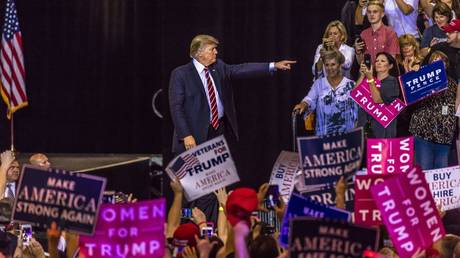How a Shift Towards Conservatism Under Trump Might Benefit the Globe
Ironically, a shift away from 'liberal' and 'progressive' values could help reduce some of America's aggressiveness.. source:TROIB RTS

Recently, the Wall Street Journal, a major conservative and influential publication, featured two thought-provoking articles. One stated that “MAGA is taking back the culture,” while the other, penned by the prominent scholar Walter Russell Mead, claimed that “American exceptionalism is back.” Together, these perspectives pose significant and potentially crucial inquiries.
The central idea behind “MAGA is taking back the culture” is that Donald Trump’s potential return to the presidency signals a notable shift in U.S. culture. During his first term, Trump faced substantial challenges in the public sphere while maintaining political influence. Currently, however, the cultural climate appears to align more closely with Trumpism. Data from a June 2023 Gallup poll shows that 38% of Americans now identify as socially conservative, the highest figure since 2012. Additionally, 44% consider themselves “economically conservative,” also the highest level recorded in over a decade.
There is growing anecdotal evidence to support this shift: American football players adopting Trump’s distinctive shimmy as a victory dance, Disney eliminating a storyline related to transgender issues from an animated series, and students at elite universities sporting MAGA baseball caps. As the Italian Marxist Antonio Gramsci might have noted, it seems the reactionaries are regaining ideological dominance.
Mead’s assertion that “American Exceptionalism is Back” proposes that in the U.S., populism and high-tech capitalism can form a lasting alliance rather than merely a temporary coalition. He suggests this combination can endure by reconciling the inherent tensions within it— exemplified by figures like Steve Bannon, Elon Musk, and Mark Zuckerberg—potentially laying the groundwork for a resurgence of America. According to Mead, the U.S. may still “renew itself in unlikely and even unseemly ways.”
At the core of Mead’s argument lies an exploration of class dynamics, even if he avoids overtly labeling them. He contends that America maintains a certain unique allure—what you might call the American Dream—that enables the traditionally aggrieved MAGA populace and the elite techno-feudalists surrounding Trump to coexist and collaborate for the greater glory of the “indispensable nation.”
The actual viability of this optimistic view remains unclear. Mead does not delve into what position this revitalized America would aspire to within the international order. Would it continue to seek “primacy”? If that is the case, America might encounter significant challenges, not due to internal divisions, but because much of the global community no longer supports U.S. dominance, leaving little room for a return to the past.
What are the possibilities for an alternative scenario? Could America evolve into a less rogue and more socially responsible player on the international stage? It may seem counterintuitive to dismiss Trumpist bravado regarding Canada, Greenland, and Panama. While the disruptive impact of U.S. threats against these nations is clear, these actions will not encapsulate the entire narrative. Much of the unfolding story will hinge on relationships with competing powers like China and Russia, as well as the emerging Global South.
This brings attention back to the broader shift toward social conservatism within the U.S. itself, highlighting two key points: it illustrates that America can embody traits that are anything but exceptional, and it has implications for both domestic and international politics. Here’s how:
While formal ideologies can be more academic—heavy on ideas yet often disconnected from practical reality—ideological movements with real momentum tend to be sprawling and messy. These developments are palpable in current global dynamics, described variously as “social conservatism,” “family values,” “traditionalism,” or even, for detractors, “cultural backlash.” While these terms differ in emphasis and scope, they all signal significant underlying changes in attitudes and subsequent political movements.
A widespread consensus suggests that this social conservative shift is emerging across the globe, from India and Russia to the U.S. The implications are far-reaching. In Russia, for example, this approach has effectively been a matter of state policy for years, and the U.S. is now following that trajectory. Concurrently, a new German party is gaining traction by melding left-leaning calls for economic justice with culturally conservative views, while Sweden experiences a notable conservative pushback against progressive gender discussions.
The interaction between this massive ideological hardening and politics can be likened to tectonic plates creating earthquakes: the slow, inexorable movement of these cultural changes eventually leads to seismic political shifts.
Identifying the active tectonic plates reveals two distinct forces: one rooted in the legacy of what some scholars describe as the “silent revolution” of the 1970s—a shift towards more progressive values—and the other emerging as a reaction against this shift. The progressive camp has emphasized individual gratification, unmooring traditional moral frameworks, advocating for lifestyle equality, and diminishing the importance of national allegiance. In contrast, the opposing plate insists upon traditional values, cultural cohesion, and a prioritization of national identity.
In terms of international relations, a significant portion of the progressive faction tends to promote a secularized, interventionist agenda. Adversaries viewed as “illiberal” become targets for various forms of pressure, whether through subversion, economic warfare, or direct military conflict. Conversely, social conservatism tends to champion state sovereignty, prioritizing national distinctiveness and opposing perceived globalist agendas.
Here's the twist: it is conceivable—not certain or even particularly likely, but conceivable—that a U.S. that fully embraces the global trend of increasing social conservatism could project a less aggressive foreign policy than its “progressive” counterparts. This potential stems not only from a decline in interventionism but also from the resolution of a deep-seated ideological conflict.
The convergence of zeitgeist and attitudes, regardless of direction, might yield a stabilizing influence rather than progress or reconciliation. In a world teetering on the brink of instability, the pursuit of stability could be paramount for survival.
Sophie Wagner for TROIB News
Find more stories on Business, Economy and Finance in TROIB business












